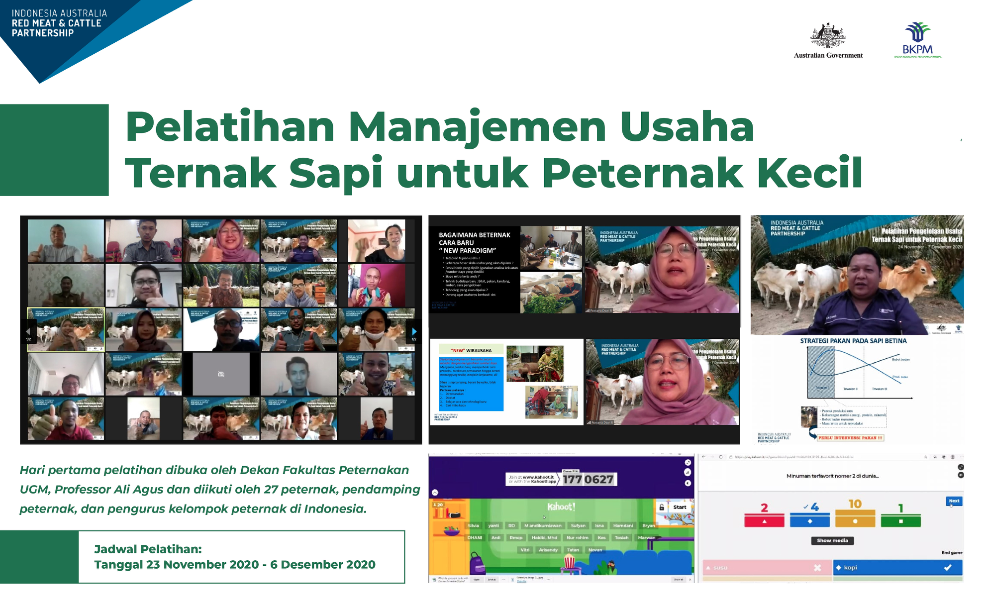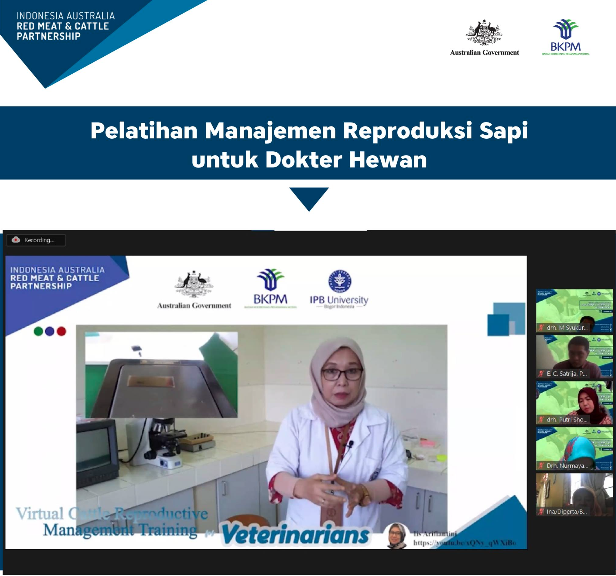Innovative Training Refocuses Farming Attitudes
Even in the face of COVID-19 restrictions, the Partnership has found a way to launch a new cattle management training module and provide continuity for an existing program.
In late 2020, as the COVID-19 pandemic raged throughout many parts of the world, 27 representatives of the Indonesian cattle industry took part in the Partnership’s first-ever Cattle Business Management for Commercial Smallholder Farmers training program.
The delivery of this short course, conducted from 24 November to 6 December 2020, highlights the Partnership’s enduring commitment to support the red meat and cattle sector in Indonesia and was made possible by pioneering new online training methods.
Through the use of online streaming services combined with pre-recorded video content and case study materials prepared in digital formats, the course encouraged participants to manage their farms more efficiently and increase the value of their businesses through more profit-oriented management practices.
SMALLHOLDER FARMERS ENGAGE WITH ONLINE TRAINING
The Cattle Business Management for Commercial Smallholder Farmers course was facilitated by the Faculty of Animal Science of Gadjah Mada University (UGM), with opening remarks from Professor Ali Agus, Dean of the UGM Faculty of Animal Husbandry.
Dr. Panjono, one of the course facilitators from UGM, says the goal of the training was to change the mindset of smallholders so they see cattle farming as a profit-making business rather than as a subsistence activity or hobby.
“We train the participants on how to work in groups and create a more dynamic business,” Panjono says.
“We also connect them with services they can use, for example banking and insurance, and teach them how they can gain access to finance.”
The online course conducted in late 2020 included a presentation from a representative of Bank Rakyat Indonesia Agro, who showcased how smallholder farmers could access loans through the People’s Business Loans (KUR) scheme.
Asuransi Jasindo provided information on how insurance can play an important role in cattle businesses, while PT Widodo Makmur Perkasa highlighted the commercial success of their smallholder farmer coorperative.
“Overall, the participants were enthusiastic and we had a lively training, even though we could not meet physically,” Dr. Panjono says.
Iin Sainah, one of the course participants from Kuningan in West Java, agrees, stating that the interactive training was highly informative and very useful.
“I was really engaged in the training, even though it was online. As a beginner smallholder farmer, I thought the materials were very comprehensive,” says Sainah, who is the first female cattle farmer in her village and the head of her local farmers group.
Having started her cattle farm with 10 cows at the beginning of April 2020, Sainah admits that her lack of experience meant she previously had reservations about expanding her business, especially because she had already spent most of her savings on the farm.
The Partnership training has, however, given Sainah new management tools and techniques and enabled her to think about the future in a more commercial way.
Following the training in late 2020, Sainah was able to purchase three cows in early 2021 after selling three during Eid Al-Adha at the end of July 2020.
“Alhamdulillah (Praise God), my farm has been going well,” Sainah says. “I’m grateful for the training from the Partnership. It has helped not only me but also members of my farmer group.”
Another participant, Sufyan Mashuri from East Java, says the course has helped him discover ways to endure the economic effects of the COVID-19 pandemic.
“The cost of animal feed was continuing to rise and I was worried if my farm could survive,” Mashuri says. “But, with the training, I now have knowledge on how to reduce my feed costs and improve my farm.”
Mashuri has a plan to lower feed costs by making his own feed concentrate, working together with other smallholder farmers.
In addition to herd management concepts, the Partnership’s course for smallholder farmers offered a dedicated session on gender equality and social inclusion, promoting women’s participation in the cattle industry.
As a female farmer, Iin Sainah found this session especially relevant.
“I have more confidence now to lead my farmers group as a woman. That said, overall, I have never had a problem being a female farmer in my village. They all welcome and respect me.”
TRAINING BENEFITS REPLICATED FOR VETERINARIANS
Again, applying technological innovation to traditional capacity building, the Partnership was able to deliver a second instalment of its Cattle Reproduction Management for Veterinarians course, from the 7th to the 11th of December 2020.
Following on from the initial course conducted in July 2019, the 2020 online training program was facilitated by the Bogor Institute of Agriculture (IPB) and attracted 30 veterinarians from all over Indonesia.
IPB lecturer, Dr Muhammad Agil, who also facilitated the Partnership’s program on cattle pregnancy testing in May 2020, says the course coordinators worked well to reproduce both theoretical and practical aspects of veterinary science and cattle reproduction in a virtual environment.
“We utilized videos and case studies to make the lessons as interactive as possible,” Dr Agil says.
“We made sure that practical and hands-on learning could be transferred into an online world. So, not only did we provide workshop materials, we also divided the participants into groups and gave them different cases related to cattle reproduction. These cases were then discussed and presented in class.”
Dr Agil says the training also included comprehensive theoretical sessions. Some of the topics covered included the selection and basic protocols of the Breeding Soundness Examination (BSE), semen collection and evaluation through macroscopic and microscopic tests, frozen semen handling techniques, libido assessment systems, reproductive theory and pathology of cattle pregnancy, pregnancy examination techniques such as rectal palpation and ultrasonography, and the theory of cattle reproductive disorders and diseases.
Pandu Tokoh Amukti, a participant from the Bondowoso Department of Agriculture, says that, although the course was held virtually, the content and discussions were invaluable.
“I found that every aspect of the course was applicable in the field,” he says.
As a veterinarian who works with cattle farmers in East Java, Amukti explains that one of the biggest challenges he faces is farmers’ knowledge of maintaining cattle reproductive health.
“For the past month, I’ve been using the knowledge I got from the training and applying it to the problems that are faced by our farmers. And it works!”
Another participant, Syahrini Rauf from the South Sulawesi Provincial Official, says the training was highly beneficial for veterinarians working in remote areas, as it allowed the sharing of ideas on different cases and problematic issues.
“Discussing other cases related to cattle reproduction was really useful,” Syahrini says.
For more information on the Partnership’s Skills Development Programs, visit https://redmeatcattlepartnership.org/project/3/capacity-building










